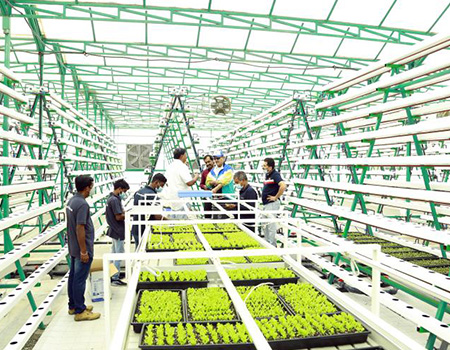If you're a beginner looking to start hydroponics, learn about it with Getting Started with Hydroponics. If you have already mastered hydroponic technology, you can also learn more about hydroponic planting from us.
1. Is the difficulty of hydroponic planting the same among different crops? If not, how are they distributed? Which crops are easier to grow hydroponically and which are more difficult?
The difficulty of hydroponic cultivation varies between different crops. Water-loving crops are easier to grow hydroponically. Green leafy vegetables, for example, are relatively easy to grow, especially hydroponic lettuce.
Root crops are difficult to grow, such as potatoes and onions, which have a long growth cycle and have different requirements for light and temperature.
2. If I want to start planting, what kind of hydroponic system is more suitable?
There are many hydroponic systems on the market, such as
hydroponic tower systems,
zip systems,
indoor hydroponic grow cabinets and ebb and flow table, etc. Each hydroponic system has its own characteristics. We need to choose according to our own planting types and choose the planting scale, for example, the hydroponic tower system can grow green leafy vegetables and strawberries, etc. If you want to grow cucumbers and tomatoes, you can choose substrate cultivation, that is, the Dutch bucket system, and the aeroponics system is more suitable for onions and potatoes .
3. What are the requirements for the cultivation of hydroponic vegetables? Are there any requirements on planting scale, etc.? What are the costs of growing at home and on a commercial scale?
When it comes to the cultivation of
hydroponic vegetables, many people will ask: how to grow them, and can hydroponic technology be learned. Now we can share with you some relevant requirements for growing hydroponic vegetables.
Elements of hydroponic vegetable growing:
One is water and fertilizer (nutrient solution)
The second is the corresponding hydroponic equipment to store water and fertilizer solutions,
The third is the control system for the planting environment, such as temperature, light, etc.
If you pay attention to these points when hydroponics, generally the crops produced by hydroponics will be good.
As for the scale of planting, there are no hard and fast requirements, and both domestic and commercial use are acceptable. The cost of planting is mainly the initial investment in basic equipment (greenhouses, plant factories and hydroponic equipment), which are relatively large, but the cost of large-scale planting will definitely be low. If you want to grow indoors at home, we can customize the size according to your requirements.
4. Is there any difference in nutrition and health between hydroponic vegetables and traditionally grown vegetables? Could crops grown without soil be highly nutritious?
It can be said that many people are concerned about this topic. We can also tell you with certainty that hydroponic vegetables are no different from conventional soil-grown crops in terms of nutritional health.
Traditional fruit and vegetable planting obtains the required nutrients from the soil, while hydroponics directly absorbs the nutrients required for growth from the nutrient solution.
In the traditional soil cultivation mode, it is difficult to prevent the heavy metal pollution of the soil, the growth of soil-derived pathogenic bacteria and microorganisms invading fruits and vegetables, and manual monitoring can prevent heavy metals, toxic and harmful substances, etc. from being mixed into the nutrient solution.
Since the nutrient supply in the hydroponic growth process is more sufficient and timely than soil cultivation, hydroponic technology can provide optimal growth conditions for fruit and vegetable cultivation, so the yield and quality of hydroponic vegetables are higher than soil cultivation, and hydroponic fruits and vegetables are usually safer. But the nutritional content can only be said to be no less than that of traditional fruits and vegetables.



.jpg)






